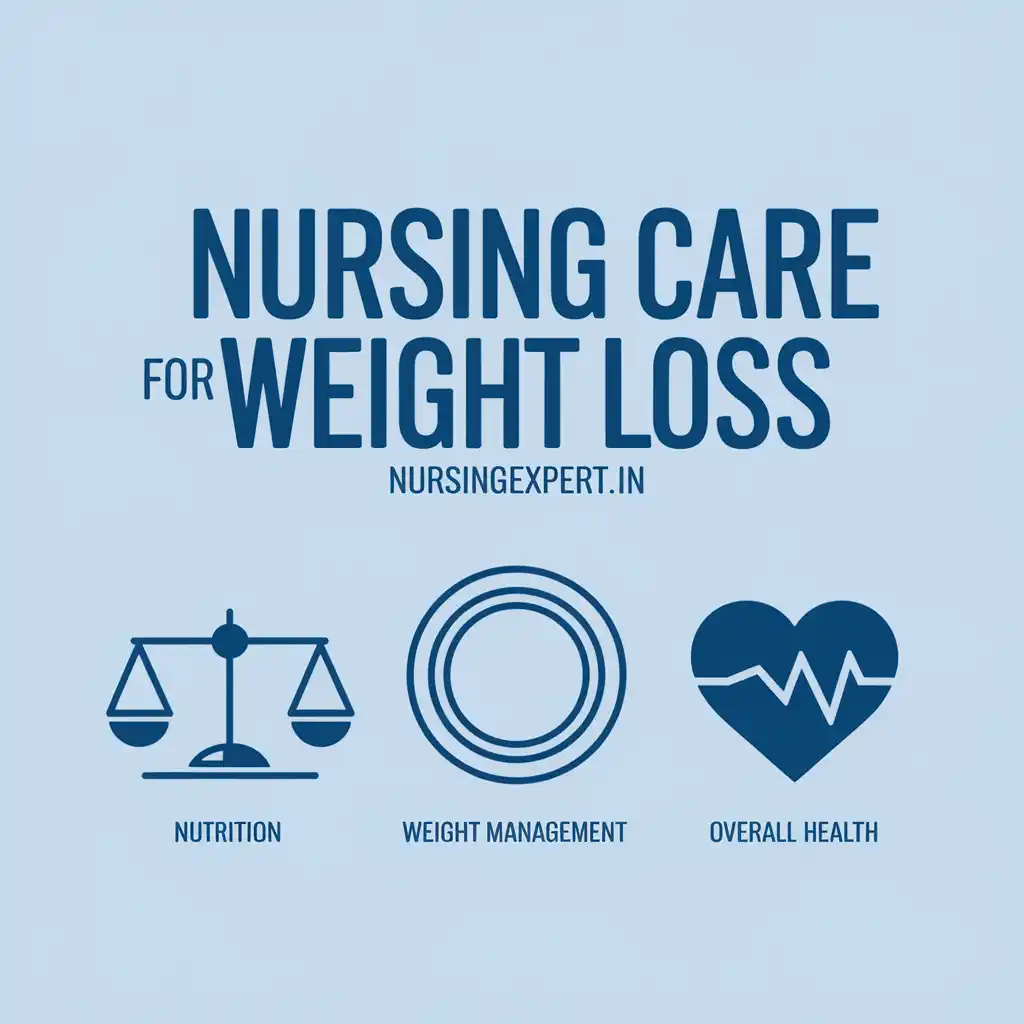Weight loss can occur due to various medical conditions, stress, or inadequate nutrition. A structured nursing care plan for weight loss helps nurses assess patients, set clear goals, and implement targeted interventions. This article outlines key components of a nursing care plan for weight loss. It offers practical strategies to support nutritional status and overall health. A downloadable Nursing Care Plan for Weight Loss PDF Download is available for clinical practice and exam preparation.
Thank you for reading this post, don't forget to subscribe!
1. Introduction
Weight loss can negatively impact health and quality of life. Nurses use a nursing care plan for weight loss to assess nutritional status, identify problems, and implement effective interventions. This guide explains the essential steps in managing weight loss and provides practical strategies to improve patient outcomes. A downloadable PDF version is available for quick reference during clinical practice and exam preparation.


2. Understanding Weight Loss
Weight loss involves a reduction in body weight that may result from poor nutrition, chronic disease, or psychological factors. It can lead to muscle wasting, fatigue, and reduced immunity. Early detection and intervention are crucial for restoring proper nutrition and enhancing overall health.
3. Pathophysiology of Weight Loss
Weight loss occurs when energy expenditure exceeds energy intake. Factors such as malabsorption, chronic illness, or metabolic changes can contribute. The body responds by breaking down muscle and fat stores, leading to reduced muscle mass and energy levels. Understanding this process helps nurses develop interventions that promote healthy weight gain and improved metabolic function.
4. Etiology of Weight Loss
Weight loss may be caused by:
- Inadequate Nutrition: Insufficient calorie and nutrient intake.
- Chronic Diseases: Conditions like cancer, gastrointestinal disorders, and HIV/AIDS.
- Psychological Factors: Stress, depression, and eating disorders.
- Medications: Drugs that affect appetite or metabolism.
- Malabsorption: Poor digestion and absorption of nutrients. Identifying the cause guides the nurse in creating a personalized care plan.
5. Signs and Symptoms of Weight Loss
Common signs of weight loss include:
- Noticeable reduction in body weight
- Muscle wasting and reduced strength
- Fatigue and low energy
- Loss of appetite
- Nutritional deficiencies observed in lab tests
- Changes in skin and hair quality
Early recognition of these signs is essential for timely intervention.
6. Nursing Diagnosis for Weight Loss
Using NANDA guidelines, common nursing diagnoses for weight loss include:
- Imbalanced Nutrition: Less Than Body Requirements related to inadequate dietary intake.
- Chronic Energy Deficit related to excessive energy expenditure and poor nutrition.
- Risk for Infection related to malnutrition and decreased immune function.
- Ineffective Health Management related to a lack of knowledge about proper nutrition and self-care.
- Impaired Physical Mobility related to muscle weakness and weight loss.
These diagnoses help focus interventions on improving nutritional status and overall health.
7. Nursing Interventions for Weight Loss
Key nursing interventions include:
- Nutritional Support:
Provide a high-calorie, nutrient-dense diet in collaboration with a dietitian. This improves energy levels and supports tissue repair. - Appetite Stimulation:
Use prescribed appetite stimulants if necessary and encourage small, frequent meals. This helps increase food intake. - Monitoring Nutritional Status:
Regularly assess weight, body mass index, and laboratory values. Ongoing monitoring guides timely adjustments in care. - Pain Management:
Administer pain medications to relieve discomfort that interferes with eating. Reducing pain helps the patient consume more nutrients. - Education on Nutrition:
Teach the patient about the importance of a balanced diet, proper hydration, and calorie intake. Education empowers patients to improve self-care. - Emotional Support:
Provide counseling to address depression or anxiety that may reduce appetite. Emotional support enhances overall well-being. - Promote Physical Activity:
Encourage gentle exercises to maintain muscle strength without exhausting the patient. Light activity supports a healthy metabolism.
8. Nursing Management Strategies
Effective management of weight loss requires:
- Initial Assessment:
Perform thorough assessments of nutritional status, weight, and lab values. - Ongoing Monitoring:
Track changes in weight, appetite, and energy levels. Adjust interventions based on patient progress. - Patient Education:
Reinforce self-care practices and nutritional guidelines through regular teaching sessions. - Follow-Up Care:
Schedule regular follow-ups to monitor progress and update the care plan. - Interdisciplinary Collaboration:
Work with dietitians, physicians, and mental health professionals to provide comprehensive care.
This integrated approach supports patient recovery and long-term health.
9. Patient and Family Education
Educate patients and families on:
- Understanding Weight Loss:
Explain the causes and health risks associated with weight loss. - Nutritional Guidelines:
Provide clear dietary recommendations to boost calorie and nutrient intake. - Medication Adherence:
Stress the importance of taking prescribed medications and supplements. - Self-Care Practices:
Teach methods to manage stress and encourage regular meals. - When to Seek Help:
Identify warning signs that indicate the need for prompt medical attention.
Effective education improves self-management and enhances treatment outcomes.
10. Interdisciplinary Collaboration
A team approach is key in managing weight loss. Nurses should collaborate with:
- Physicians:
To adjust treatment plans and monitor underlying conditions. - Dietitians:
To develop tailored meal plans that meet nutritional needs. - Pharmacists:
To ensure safe medication use and prevent interactions. - Physical Therapists:
To design appropriate exercise programs. - Mental Health Professionals:
To address psychological factors that affect appetite. - Social Workers:
To connect patients with community support services.
This collaboration ensures comprehensive, patient-centered care.
11. Sample Nursing Care Plan for Weight Loss
Below is a sample nursing care plan for weight loss:
| Assessment | Nursing Diagnosis | Goal/Expected Outcome | Intervention/Planning | Implementation | Rationale | Evaluation |
|---|---|---|---|---|---|---|
| Subjective Data: – Patient reports loss of appetite and unexplained weight loss. Objective Data: – Notable weight reduction; lab tests show low protein levels. | Imbalanced Nutrition: Less Than Body Requirements related to decreased caloric intake as evidenced by weight loss and low albumin levels. | Short-Term: – Within 48 hours, the patient will consume small, frequent meals. Long-Term: – Patient will maintain a stable weight and improved nutritional markers. | Develop a high-calorie, nutrient-rich dietary plan; provide education on food choices and meal timing. | Collaborate with a dietitian; monitor daily food intake and weight; offer nutritional supplements if needed. | Adequate nutrition supports tissue repair and improves overall energy levels. | Weight stabilizes; lab values improve; patient reports increased appetite. |
| Subjective Data: – Patient experiences fatigue and weakness. Objective Data: – Reduced muscle mass; low energy levels observed. | Chronic Energy Deficit related to insufficient caloric intake as evidenced by fatigue and muscle wasting. | Short-Term: – Within 24 hours, the patient will report reduced fatigue after small meals. Long-Term: – Patient will maintain energy levels and improved muscle strength. | Plan to administer appetite stimulants as prescribed and schedule frequent, balanced meals. | Provide prescribed medication; assist with meal planning; monitor energy levels throughout the day. | Increasing caloric intake helps boost energy and supports muscle preservation. | Patient reports increased energy; muscle strength shows gradual improvement. |
| Subjective Data: – Patient expresses anxiety about poor nutrition and health deterioration. Objective Data: – Patient appears worried; inconsistent meal patterns observed. | Ineffective Health Management related to lack of knowledge about nutritional self-care as evidenced by irregular eating habits and expressed concern. | Short-Term: – Within 24 hours, the patient will verbalize key nutritional strategies. Long-Term: – Patient will adhere to a structured meal plan and follow up with a dietitian. | Develop an education plan with clear, written instructions and interactive sessions on nutrition and self-care. | Conduct individual teaching sessions; provide handouts; schedule regular reviews of the meal plan. | Education empowers patients to manage their nutritional needs effectively. | Patient demonstrates understanding; adherence to the meal plan improves; follow-up confirms consistency. |
12. Downloadable Nursing Care Plan for Weight Loss PDF Download
Nursing Care Plan for Weight Loss PDF Download
Access our complete Nursing Care Plan for Weight Loss PDF. This document provides detailed, step-by-step instructions, NANDA-based nursing diagnoses, targeted interventions, and patient education strategies to manage weight loss effectively. Use this resource for clinical practice or exam preparation.
13. Frequently Asked Questions (FAQs)
- What causes weight loss in patients?
Weight loss can result from inadequate nutrition, chronic diseases, psychological stress, or malabsorption issues. - What are the common signs of weight loss?
Common signs include noticeable weight reduction, muscle wasting, fatigue, and nutritional deficiencies. - What is the primary goal of a nursing care plan for weight loss?
The main goal is to improve nutritional intake, stabilize body weight, and enhance overall energy and health. - Which interventions are most effective for managing weight loss?
Effective interventions include nutritional support, appetite stimulation, pain management, and patient education. - How do nurses evaluate the success of a weight loss care plan?
Nurses assess improvements by monitoring weight, nutritional lab values, patient energy levels, and adherence to the meal plan.
14. Conclusion
A structured nursing care plan for weight loss is essential for improving patient outcomes. By assessing nutritional status, implementing targeted interventions, and educating patients on self-care, nurses can help stabilize weight and enhance overall health. Collaborative care and ongoing monitoring are key to successful management.
15. References and Sources
- Mayo Clinic. (2023). Weight Loss: Causes and Treatments. Retrieved from https://www.mayoclinic.org/diseases-conditions/weight-loss
- MedlinePlus. (2023). Nutrition and Weight Loss. Retrieved from https://medlineplus.gov/nutrition.html
- NANDA International. (2022). NANDA Nursing Diagnoses: Definitions and Classifications. Retrieved from https://www.nanda.org/
- American Nurses Association. (2022). Nursing Scope and Standards of Practice. Retrieved from https://www.nursingworld.org/
- Centers for Disease Control and Prevention (CDC). (2023). Healthy Weight. Retrieved from https://www.cdc.gov/healthyweight


